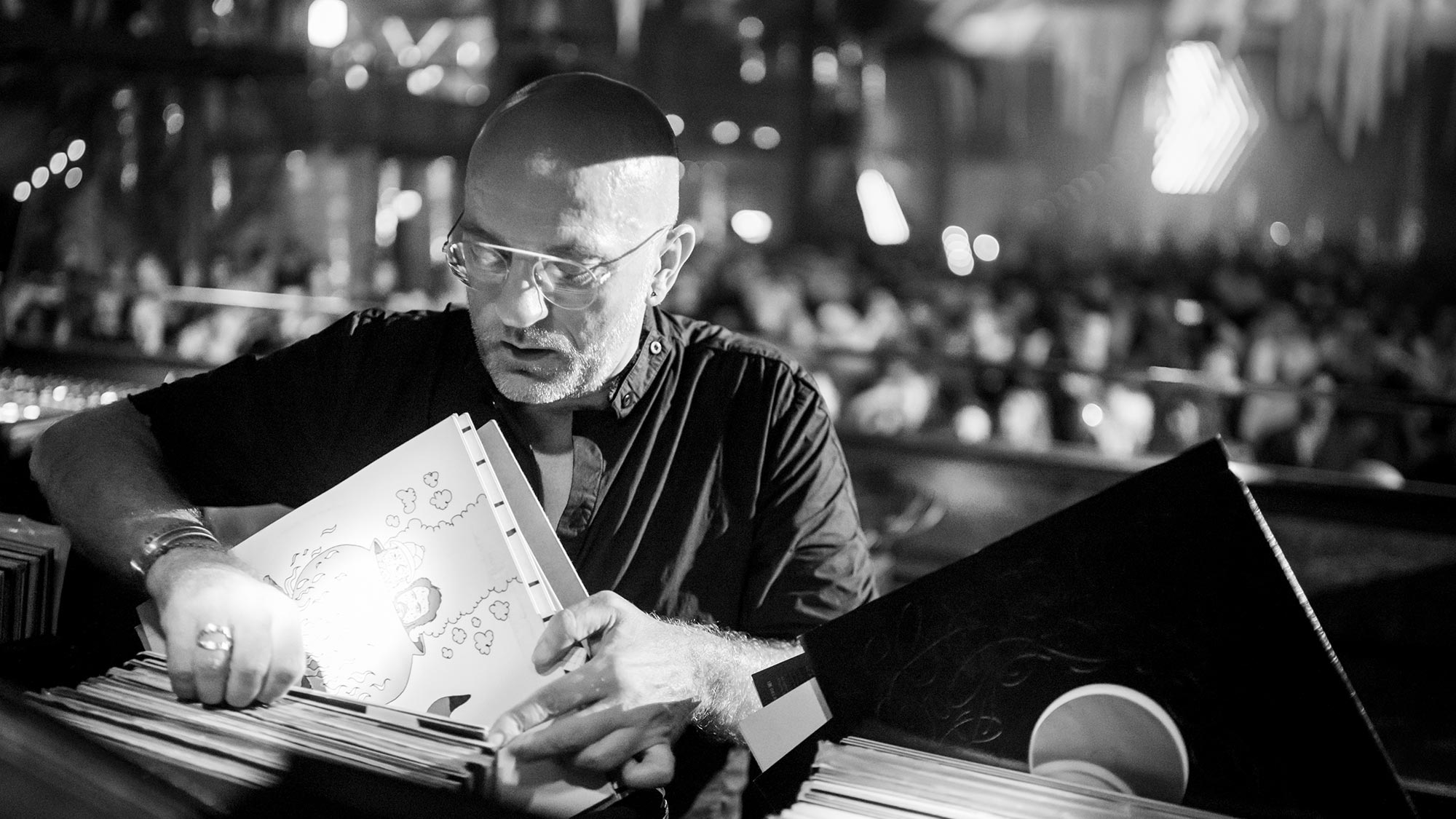Sven Väth at Amnesia in Ibiza this summer. All photos: phrank.net
Hier findet ihr die deutschsprachige Fassung des Interviews.
Hardly any DJ represents the history of techno in its diversity as comprehensively as Sven Väth. Not just merging an unusually broad spectrum of music, he has also shaped the scene as a label maker, club operator and event host. Groove’s editor-in-chief Alexis Waltz visited Väth and the Cocoon family on the occasion of the 20th anniversary of their activities in Ibiza. In the resulting feature, Väth appears in the mirror of his co-workers, colleagues, friends and fans. Now Sven Väth speaks for himself. In the first part of the extensive interview we discuss the current state of Ibiza’s ever evolving club scene.
The 20th anniversary party with your gig and the Underworld concert at Club Ushuaïa, the start of the season at Amnesia a day later and the concluding afterhour at Benimussa Park and the after-afterhour at Rabbit Hole was quite a trip.
Sven Väth: (laughing) What should I say? We were a little tense. It was a challenge: a club like Ushuaïa, with its reputation and the programing they normally run, to set ourselves up over there with our opening to Cocoon’s 20th season and the Underworld concert. Their live show would not have been possible in any other location on Ibiza. We already imagined it would go great with the amazing stage, which we knew from earlier events and the outstanding technical equipment. But we were not so sure about the whole event: who will come? Will our hardcore fans get excited about it? Will they show up? And, obviously, the weather was also an issue.
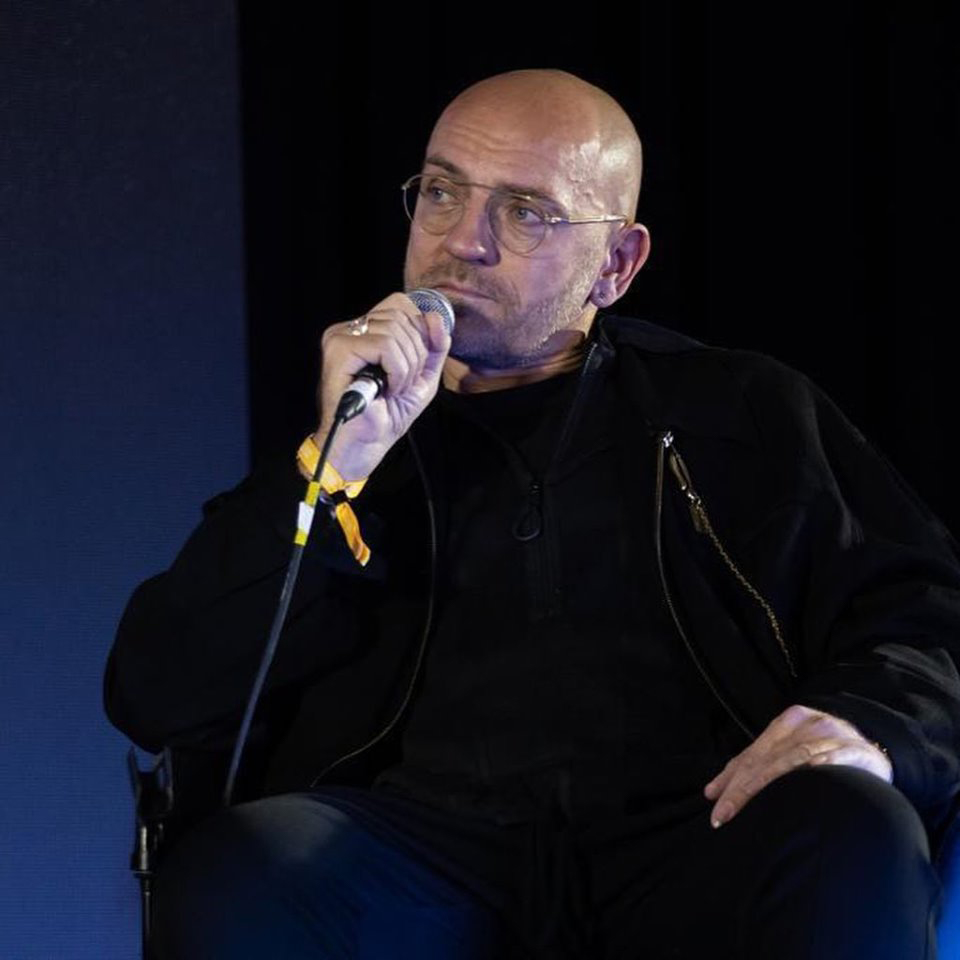
In the past, you made critical statements about Ushuaïa. You said it does not reflect your understanding of Ibiza’s club culture.
I did. We have been doing events at Ushuaïa’s former location from the beginning though. I played a legendary b2b-set with Luciano lasting 12 hours. When the club reopened at its new location its concept was fully reorganized, with the pool and the hotel – it turned out quite Miami-like.
An European understanding of clubbing was gone.
But nowadays, Ushuaïa as well as Hi Ibiza are the champions on Platja d’en Bossa [the party strip of Ibiza city]. The guys from Ushuaïa also set up an in-house party series, Ants, with a techno-heavy booking, aiming at the younger generation. So I would rather say today: they have established themselves and are trying to drive a credible program as well. I wasn’t there recently, but I must praise our cooperation honestly, also in regards to their team and the arrangements we made, everything went smoothly. This is a level of cooperation and professionalism we hardly experience on Ibiza.
The parties at Ushuaïa were not your only new experience this summer. You also returned to Amnesia after you switched to Pacha last year. What was that all about?
We just could not handle Pacha. The new operators of the club have a private equity background, they are finance people who do not understand club culture, who do not care about artist development. They also have no patience to have a club night develop itself during the course of the season. We noticed it pretty early: The chemistry was just not right.
What was the exact problem?
I believe we performed well. But we were not satisfied with the layout of the room, the DJ booth being set up in the center with the VIP area behind the DJ. I always felt a strange energy in my back. The tables are very important there, they have to be fully booked. This brought in a certain amount of tension. I did not feel comfortable one hundred percent, and I do not believe many others did. We agreed to separate at the end of the year.
Why was the return to Amnesia the only option?
To be honest, I certainly could have imagined to move to a new club for yet another proper party after 20 years of Cocoon on Ibiza. But I figured we’d go back to where it all started, but at this time with a non-exclusive deal, being able to include other venues like Ushuaïa, like Benimussa Park, the DC10, the Blue Marlin or the Pikes Hotel – and one or the other after hour highlight. I believe it will do justice to the 20 year anniversary to party in different locations and to have the posse come along.
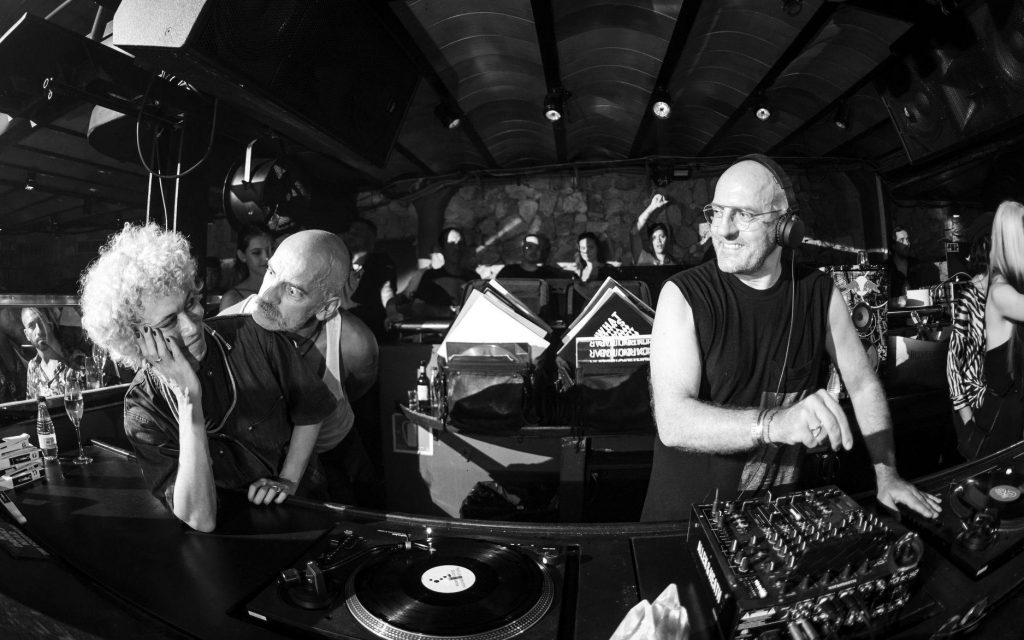
But you also had a varied and at times difficult history with Amnesia. At one point, the club’s owners encouraged DJs from your own party to set up their own event series. Back then, the separation from some of your peers hurt you deeply. What’s your opinion about this fallout nowadays?
I still say honestly that it was a big disappointment. If you look back to how it all started, how owners of the club lured away our DJs from behind our backs, it still feels mean and scornful. And the fact that the DJs joined in, that was a big deal as well. More and more DJs or their managers or agents thought that they should start off their own thing. And the clubs supported them. This all happened after so many years at Amnesia, our mothership. Having been treated this way, that was just bad style. I still believe this to this day.
„There are just too many club nights. Sometimes the DJs are so greedy to play. Accepting every booking offer, they do not even preserve a tiny bit of exclusivity. If you play at every party, things get stale. If I can hear a certain DJ at any club, it’s not really exciting anymore for the guest.”
How did you get rid of this negative attitude towards the club?
We do our own event, we bring our own people, we bring our spirit own with us. It worked really well again last Monday with Solomun, Charlotte [de Witte], ROD [Benny Rodriguez] and Gregor Tresher: it was a great evening. Our guests put in a lot of support and energy as well. They were impressed we made this step going back. And the response was amazing. It was definitely bigger than the move going from Amnesia to Pacha. (laughing)
I have also experienced this as your return home, the crowd is diverse but it jointly understands and accepts this move.
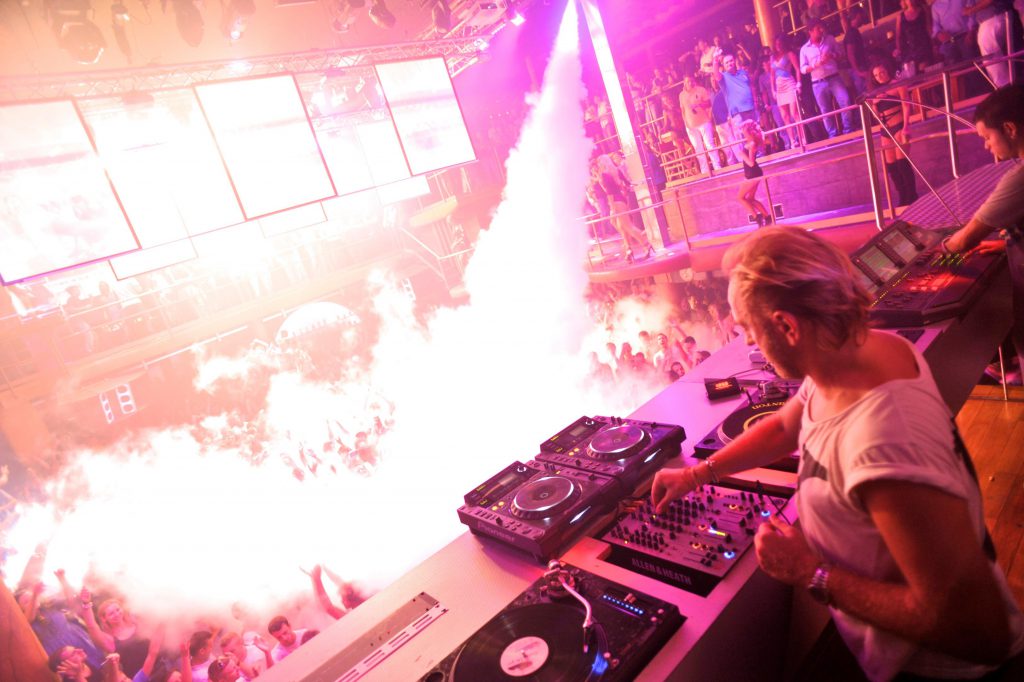
It is being appreciated. I have seen many familiar faces as well as many locals and longtime fans.
You have been a point of reference on Ibiza for two decades, but beyond your party there is an inextricable array of events on the island nowadays. DJs do their own parties, promoters organize parties, clubs host parties. Some of them with a stronger focus on techno, some of them with an eclectic programing also including EDM. Cocoon takes a different approach relying on certain understanding of techno and house, operating from a particular scene with a particular story.
That’s right, but that’s just what happens to you as a pioneer. You have an idea, you set something up, it starts to work, people love it and the thing becomes a success. This also paved the way for the music and the DJs who grew up with us. It encouraged them to try to imitate us. Many have done that, and many have failed. That’s why it’s not that special anymore, there is an abundance of DJs from our genres nowadays. There are just too many club nights. Sometimes the DJs are so greedy to play. Accepting every booking offer, they do not even preserve a tiny bit of exclusivity. If you play at every party, things get stale. If I can hear a certain DJ at any club, it’s not really exciting anymore for the guest. The scene on the island lost its identity. We have a different standing, we have been here for 20 years and received a certain accolade for the real, the pure party.
„The island as itself as well as its history is not really appreciated nowadays. Ibiza serves as a business hub for promoters to represent DJs in order to get better international billings, fees or whatever. Not everybody, but many fly in, play their two hour sets – they don’t have more to offer anyways – and leave at once.”
How do you set yourself apart from other parties nowadays?
We assemble people from different countries on the dancefloor. Some parties on Ibiza are only popular among Italians or Brits. I do not want to name promoters, but I think that’s extreme. To me, that’s not Ibiza. Ibiza was and still is a kettle of different things. You meet music lovers, ravers, artists, the birds of paradise. I feel they are still here. Of course, one also notices the tough competition, the island being generally in decline in terms of numbers. And Ibiza has gone crazy in terms of pricing over the last few years. The prices are sometimes no longer justifiable.
How does it fit together: Ibiza is getting more and more expensive, there are more parties, but fewer people attending those parties?
That’s the madness! The island actually needs a proper detox from promoters and DJs, they have to be sorted out eventually. (laughing) At the IMS [Ibiza Music Summit] on my panel someone asked what I would recommend to a young promoter to do. What kind party concept, what is working nowadays? I replied: „Honestly, you need to find another island!” (laughing) Well, go somewhere else. I know Ibiza since 1980. I really loved the island, it is a part of me. I absorbed a lot of inspiration here, I have been living here, that’s why I was able to give back to this extent. I have the feeling the island as itself as well as its history is not really appreciated nowadays. Ibiza serves as a business hub for promoters to represent DJs in order to get better international billings, fees or whatever. Not everybody, but many fly in, play their two hour sets – they don’t have more to offer anyways – and leave at once.
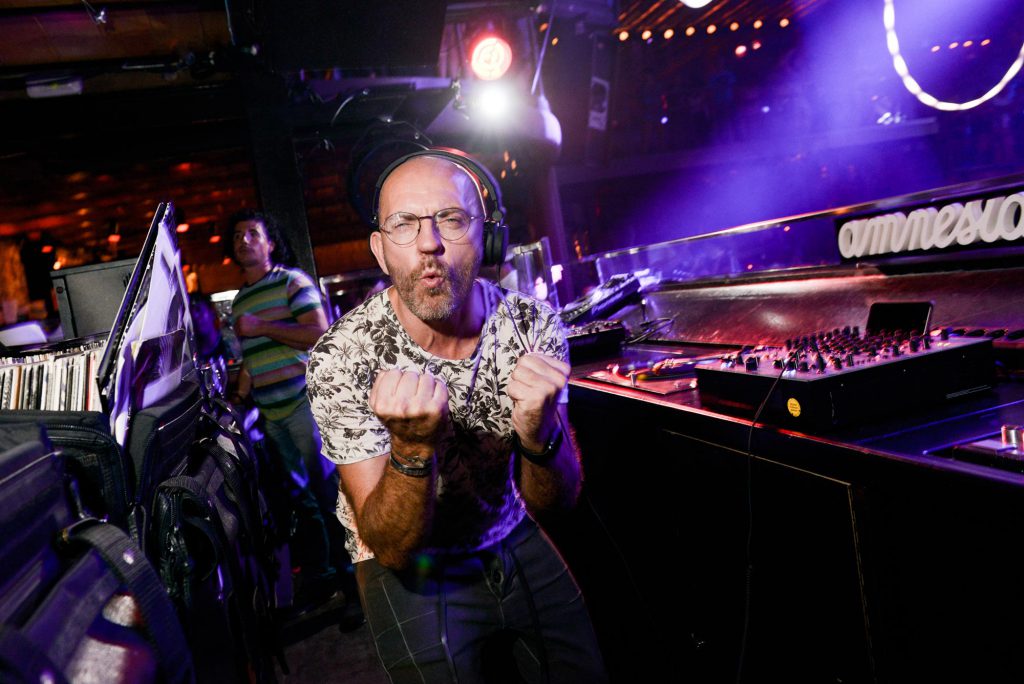
That’s the everyday life of the traveling DJ. What kind of harm does it do to Ibiza ?
This is an urban approach, you can witness it in every major city. But something made its way to Ibiza that does not belong here. We actually do have a beautiful island with a Mediterranean feel – and now everybody is wearing black! (Laughing). I think you have to absorb the spirit of the island. Of course people travel here to celebrate, it surely is a place to party, but you should bring along a bit of respect. Not just shamelessly exploit it and completely overstretching the bow.
Many DJs think they need to play Ibiza two or three times each season. They show up at some random party, they are shocked by the high prices, they do not understand the island’s charm and are dissatisfied. Nevertheless, they will return next year. Obviously, it’s tough to cancel a lucrative booking and the exposure that comes along with it. Still, it’s not the experience that they need.
Right.
You are in a privileged position: you got to know the island really early. You moved to Wiesbaden [close to Frankfurt] with your mother in the late seventies. At 16, you happened to chat to a group of students at a pub who raved about Ibiza. Their stories aroused your curiosity. When you received your first unemployment cheque after your apprenticeship, you traveled to the island.
That’s right. (laughing)
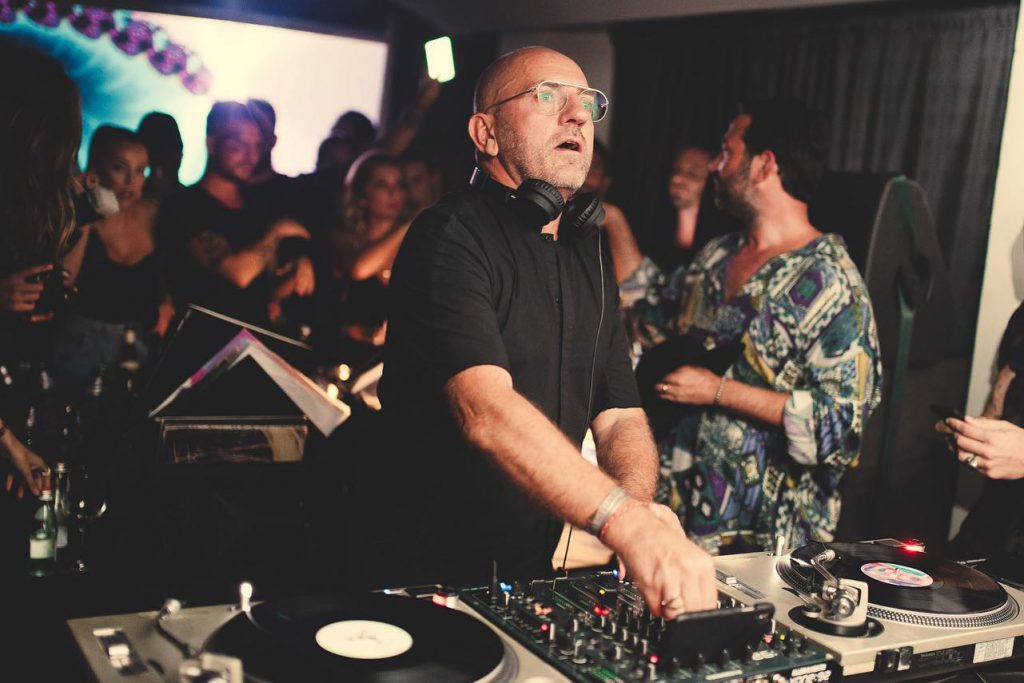
What did you experience on Ibiza back then?
That was the early eighties, there were a lot of Italians and also Germans and French, but not that many Englishmen. British promoters with nights like Ministry of Sound or Gate Crasher only came in the nineties. That was when Ibiza no longer got me excited. Back then I was traveling in India. Ibiza did not inspire me at all, it just was British trash. At the end of the 90s, I played at Amnesia at a Bugged Out party. Club Space approached me, they invited Mark Spoon, DJ Dag and myself. In the late 90s, I played the openings and closings in Space until Amnesia’s Junior, Martí [Ferrer], asked if we could meet. At the meeting, they offered me a night of my own. That was ’99. I thought: „Now you do it by yourself, you have to change something here. Otherwise, you’ll never come back!” (laughing)
In a Groove cover story from 2000 written by its founder Thomas Koch you talked about „the experiment of an Ibiza summer residence”.
Exactly, we let fly four test balloons in ’99. I did not go straight into a full season because I knew it would be quite a big financial undertaking. Of course, I also wanted to test how the event would be received. Back then, we had about 90 percent guests from Germany at our parties, as we did a lot of TamTam, a lot of promotion in Germany, pushing our networks announcing we are now on Ibiza with Cocoon. MTV was there as well, they had a summer camp here. (laughing, pauses). We had a lot of fun in the first two years. We were definitely experimenting. (grinning)
Today, one can hardly imagine what a step it was. As I said, almost the entire scene is represented on Ibiza nowadays. But back at that time, Ibiza was dominated by British trance and old-school House from the US. Everything that happened in the Cocoon context – Ricardo Villalobos, Roman Flügel, even Richie Hawtin – was unimaginable on the island.
It was unknown on the island. Then, a magical thing happened: the Spaniards discovered us. At that time techno took off in Spain. They were our first true supporters on the island, they all came. This developed a momentum of its own. In addition, people realized we spontaneously did unannounced after hours at secret locations. Guerilla-like we drove to a beach, getting the beach operator to approve an informal agreement, setting up our sound system and doing our thing. Our after hours became something like a legend, no other promoter has done that before. Free beach parties for decades. Eventually they became too big, drawing too much attention. Penalties had to be paid. But it was the big part of our culture we brought along, a certain hunger. We do not get enough, we keep going! (laughs) People appreciated our attitude.
The Frankfurt techno scene you were part of connected to the local scene in many ways. That would hardly be possible at another place. There is also a lot of partying going in Croatia now – but there is hardly a local scene with previous experiences with electronic music. A festival lands like a spaceship, everything is set up, DJs fly in – but a week later everything is gone again.
No, there is no story in Croatia, but Ibiza has actual roots. A lot has happened here since the 1960s. The hippies have done their part with their free spirit. Equally important is the loose handling of drugs that has been going on for decades. Today, that’s not comparable anymore.
What did 16-year-old Sven experience on Ibiza back in 1980? Make sure to read out for the second part of Sven’s interview here.
